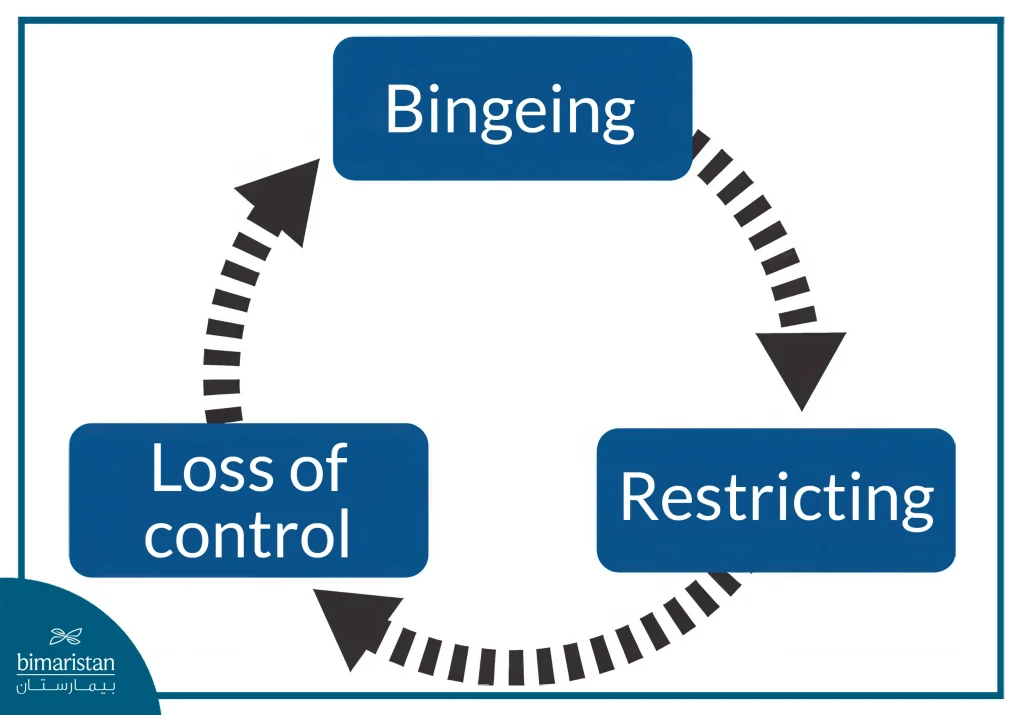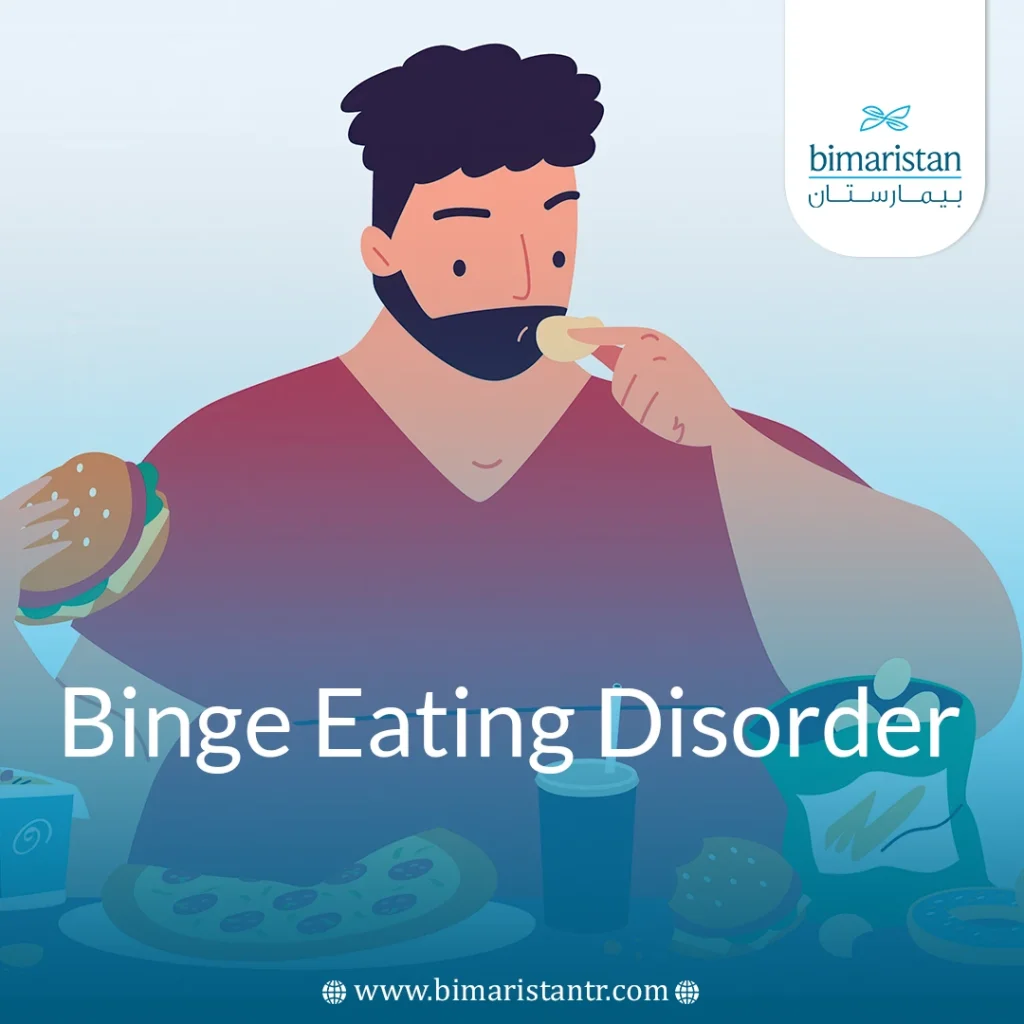One of the most common eating disorders, binge eating disorder, is a complex psychological condition characterized by eating large amounts of food in a short period of time and feeling out of control during eating episodes. The disorder not only affects physical health, but also negatively affects the psychological and social well-being of the individual. In this article, we will review the main symptoms of binge eating disorder, discuss the factors that contribute to its development, whether psychological, biological, or social, as well as highlight the options available for treatment and recovery.
What is binge eating disorder?
Binge Eating Disorder (BED) is a behavioral disorder characterized by compulsive and chronic overeating that goes beyond the occasional overeating that everyone may experience from time to time. In this disorder, eating becomes an uncontrollable behavior that accompanies the individual on a daily basis and negatively affects their physical, mental, and emotional health. The sufferer feels unable to stop eating during episodes that last for a short period of time, but in excessive amounts, often repeating once a week or more. Environmental factors such as stress and social relationships play a large role in influencing this behavior, and may interact with other factors to take a person from a mild eating disorder toa full-blown binge eating disorder.
Binge eating disorder is the most common eating disorder, accounting for about half of all diagnosed cases. In the United States alone, it affects about 3% of the population. Statistics show that it is more prevalent among women than men by a ratio of approximately 3 to 2, and more common among adolescents than adults by a ratio of approximately 4 to 3.
Symptoms of binge eating disorder: Signs that something is wrong
The symptoms of binge eating disorder are key indicators that help in recognizing and accurately diagnosing the disorder. They include not only overeating, but also complex psychological feelings such as loss of control, guilt, and anxiety after eating episodes, as well as physical symptoms such as weight changes and health issues. Understanding these symptoms is the first step towards early intervention and effective treatment:
- Feeling unable to control the eating pattern, such as not being able to stop once you start
- Eating even when you’re so full or not hungry that you don’t realize how much you’re eating
- Eating too quickly during a binge
- Eating much larger amounts of food than usual
- Eating mostly alone or in secret
- Hoarding and storing food in hidden places for later access
- Eating to the point of feeling too full

Psychological symptoms: Guilt and anxiety after eating
The psychological signs and symptoms associated with binge eating disorder include a range of emotional and behavioral changes that reflect the sufferer’s deep inner conflict. These symptoms include excessive preoccupation with food, body shape, and weight to the point of affecting daily thinking and quality of life. Sufferers often experience dissatisfaction with their physical appearance and constant worry about their size, shape, or weight, leading them to compare themselves to others and feel inadequate.
Hypersensitivity to comments about food, dieting, exercise, or body image is a common sign, as such remarks can trigger compulsive eating episodes or reinforce feelings of shame. After a binge eating episode, a person often feels intense shame, guilt, and self-loathing, as well as feelings of sadness, anxiety, and deep emotional turmoil.
Body image distortion is also a key feature, where the sufferer develops a negative and unrealistic view of their body, even if their weight is normal. Many also suffer from low self-esteem, depressive tendencies, excessive anxiety, and mood swings or extreme emotions, further complicating the condition and affecting social interaction and interpersonal relationships.
Physical symptoms: Weight changes and associated health issues
The physical signs and symptoms associated with binge eating disorder include a range of effects that may directly affect the body’s health and vital functions. One of the most prominent symptoms is a constant feeling of fatigue or exhaustion, as a result of overeating and its effect on energy levels and the normal regulation of vital processes in the body. Many sufferers also experience sleep disturbances, such as difficulty falling asleep or frequent awakenings, which is often attributed to hormonal fluctuations and feelings of anxiety and guilt associated with compulsive eating.
Common digestive symptoms of binge eating disorder include bloating, constipation, or intolerance to certain foods due to the excessive stress on the digestive system from repeated binge eating episodes. Significant changes in weight may also occur, either with large increases or frequent fluctuations, increasing the risk of obesity and its health complications.
In addition, binge eating disorder can lead to chronic digestive health issues, such as GERD or irritable bowel syndrome, as well as cardiovascular issues, including high blood pressure, high cholesterol levels, and increased risk of heart disease. These symptoms are exacerbated by a lack of balanced nutrition and regularity in lifestyle, making medical and psychological treatment essential for recovery and improving quality of life.
The main cause of binge eating disorder is still unknown, as in other eating disorders, and appears to be caused by a combination of psychological, biological, and environmental factors:
Biological causes of binge eating disorder
Research suggests that biological factors such as hormonal imbalances and genetic mutations play a role in the development of binge eating disorder. A study published in the Journal of Psychiatric Research found an association between low levels of serotonin, a neurotransmitter that affects mood, appetite, and binge eating behaviors, and low levels of serotonin, a neurotransmitter that affects mood and appetite. This suggests that chemical changes in the brain may contribute to the onset of the disorder.
Behavioral reasons
Binge eating disorder is often associated with a long history of extreme dieting, especially since the teenage years. Prolonged food restriction leads to a violent physical response of excessive hunger, which increases the likelihood of binge episodes. In addition, the psychological stress of trying to adhere to a strict diet or calorie restriction can generate strong feelings of stress, anxiety, and shame, all of which are common triggers for compulsive eating episodes.

Environmental causes
The social and cultural environment plays an important role in the development of binge eating disorder. People whose self-worth is easily influenced by external comments are more likely to develop the disorder, especially if they are bullied or ridiculed about their body shape, and idealized body stereotypes promoted through the media and social media contribute to feelings of inadequacy and low self-esteem, which increases the risk of developing the disorder.
For emotional and psychological reasons
Binge eating disorder is often accompanied by psychological and emotional factors such as low self-esteem and difficulty dealing with stress and negative emotions. Studies show an association between this disorder and other psychiatric disorders such as depression, anxiety, and attention deficit hyperactivity disorder (ADHD). Many sufferers also report a history of overeating as a means of escaping feelings of sadness, emptiness, or helplessness.
Genetics and family history
Studies show that genetics may play a role in the development of binge eating disorder. A study published in the Archives of General Psychiatry found that family members of people with obesity and binge eating disorder were twice as likely to develop the disorder compared to family members of people who were only obese without an eating disorder.
Social factors
In some cases, binge eating disorder is related to traumatic life experiences such as the loss of a loved one, divorce, physical illness, sexual or physical abuse, and bullying. Some research also suggests a link between a history of substance abuse and binge eating disorder. It is worth noting that childhood obesity is a common factor among those who develop the disorder later in life.
How is binge eating disorder diagnosed?
Binge eating disorder is diagnosed through a thorough clinical assessment by a mental health professional or physician, based on specific criteria outlined in the Diagnostic and Statistical Manual of Mental Disorders (DSM-5). The diagnosis includes the following:
I: Clinical criteria for diagnosis (according to DSM-5)
To be diagnosed, compulsive eating episodes must recur at least once a week for three consecutive months, with the following characteristics:
- Eating large amounts of food in a short period of time (usually within two hours), beyond what most people eat in the same period.
- Feeling out of control during these episodes (not being able to stop eating or control what is eaten).
Eating episodes must be accompanied by two or more of the following symptoms:
- Eating unusually fast
- Eating until physical discomfort
- Eating as a way to escape emotions, even in the absence of hunger
- Eating alone because you’re embarrassed by the amount
- Feeling self-disgust, guilt, or sadness after eating
II: Ruling out other disorders
It must be ensured that compulsive eating episodes do not occur exclusively during bouts of:
- Bulimia Nervosa
- Anorexia Nervosa
III: Assessment and Screening Tools
Your doctor or specialist may use additional tools such as:
- Detailed Psychological Interviews
- Self-assessment questionnaires
- Medical tests, if needed, to rule out associated organic conditions (such as thyroid issues or diabetes)
IV: Impact of symptoms on daily life
Another important factor in the diagnosis is to assess the extent to which this behavior affects the patient’s social, psychological, and functional life.
How to treat binge eating disorder: From behavioral therapy to medication
Treatment is essential because it not only helps reduce the seizures but also addresses the psychological and behavioral causes associated with them. Approved treatment methods include a combination of psychotherapy, nutritional support, and sometimes medication, with the aim of improving the patient’s physical and psychological well-being.
Psychotherapy (talk therapy)
Psychotherapy can help you learn how to replace unhealthy habits with healthy ones and reduce binge eating. Talking therapy may be in individual or group sessions, and examples of types of talk therapy include:
- Cognitive Behavioral Therapy (CBT): Will be detailed.
- Integrative Cognitive-Affective Cognitive Therapy (ICAT).
- Dialectical Behavior Therapy (DBT).
Medications
Medications cannot cure an eating disorder, but they work best when combined with talk therapy. Antidepressants are the most common medications used to treat eating disorders that involve binge eating behaviors. Lisdexamfetamine di-mesylate (Vyvanse) is a medication for attention-deficit/hyperactivity disorder (ADHD) and is the first medication approved by the U.S. Food and Drug Administration (FDA) to treat moderate to severe binge eating disorder, but only in adults, and because it is a stimulant, it can be addictive and misused.
Cognitive behavioral therapy (CBT) for binge eating disorder
Cognitive behavioral therapy is one of the most successful and widely used treatments for binge eating disorder. It focuses on modifying unhealthy thought and behavior patterns associated with eating. The primary goals of CBT in the treatment of binge eating disorder:
- Breaking the cycle of overeating
- Modifying negative thoughts associated with body, weight, and self
- Improving your relationship with food
- Building healthy coping skills to deal with stress and negative emotions
Multiple studies have shown that CBT is effective in reducing binge eating episodes and may also help improve mood, body image, and social relationships, as CBT does not necessarily focus on weight loss, but on behavior and mental health first.

How to support people with binge eating disorder: Tips for family and friends
The support of family and friends is a pivotal element in the recovery journey of people with binge eating disorder, as it goes a long way in alleviating the feelings of loneliness and shame associated with the disorder. Effective support begins with understanding. Those around the sufferer need to recognize that binge eating disorder is not just a weakness of will, but a complex psychological condition that requires compassion and professional treatment. It is important to offer non-judgmental listening and avoid comments about weight or food, while gently encouraging the sufferer to seek professional help. Provide a safe and stress-free environment, and encourage a healthy lifestyle without surveillance or pressure. Here are some tips:
- Learn and understand the disorder: Read more about binge eating disorder to understand that it is a psychological condition and not just a weakness of will or bingeing.
- Listen without judgment: Avoid harsh words and negative criticisms that increase stress and blame.
- Support, not control: This means not becoming a food monitor and instead encouraging an overall healthy lifestyle, such as group cooking or walking, without focusing on weight.
- Maintain a supportive environment: Encourage activities that boost self-confidence and reduce stress (light sports, hobbies, socializing) and minimize stress at home or in the environment, as it is one of the triggers of seizures.
- Encourage the person to seek treatment: Help the person accept the idea of psychotherapy, such as cognitive behavioral therapy (CBT), and offer to share a session and go with them.
In conclusion, binge eating disorder is a common and complex psychological condition that requires deep understanding and accurate diagnosis by specialists. It is associated with multiple factors, including psychological, biological, and social aspects, making it more than just irregular eating behavior. Research shows that therapeutic interventions, particularly cognitive behavioral therapy, are effective in alleviating symptoms and improving quality of life, and raising awareness of the disorder and strengthening psychosocial support is an essential step towards prevention and comprehensive recovery.
Sources:
- National Institute of Diabetes and Digestive and Kidney Diseases. (n.d.). Diagnosis and treatment of binge eating disorder. U.S. Department of Health and Human Services
- American Psychological Association. (n.d.). Eating disorders
